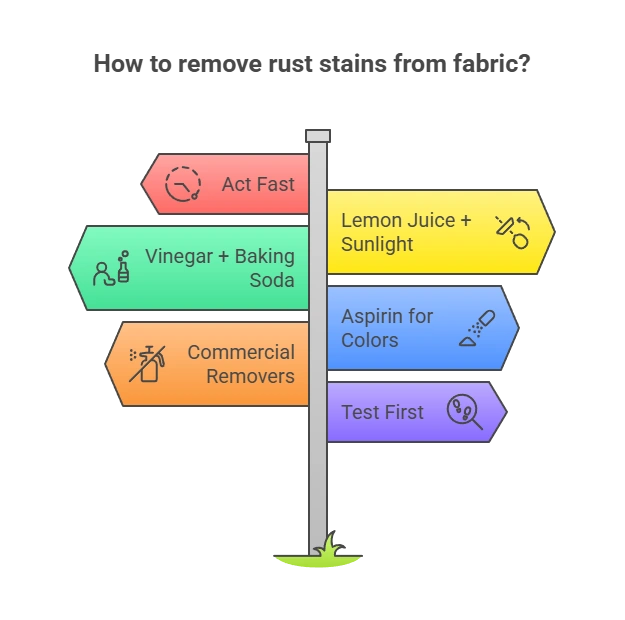- by Emma Rose
- May 1, 2025
- 0
- 0
How to Remove Rust Stains from Clothing
Rust stains on clothes can be stubborn and frustrating, but they’re not impossible to remove. For more details on common household stains and how to deal with them, check out the American Cleaning Institute.
So whether your favorite shirt brushed against a rusty surface or your jeans picked up rust from an old hanger, there are effective ways to get rid of these stains. The key is to act fast and use the right cleaning methods. In this guide, we’ll walk you through the causes of rust stains, immediate steps to take, and expert-approved solutions to restore your clothes to their original state. Let’s get started!

What Causes Rust Stains on Clothes?

Oxidation of Metal Objects (Zippers, Buttons, Hangers)
Clothing items with metal components—like zippers, buttons, or decorative chains—can develop rust over time, especially if they are exposed to humidity or left damp. Rust from these items can transfer onto fabric, leaving stubborn stains.
Hard Water Deposits on Fabrics
Exposure to Rusty Tools or Surfaces
Placing clothes on rusted outdoor furniture, using old metal hangers, or brushing against rusty railings can all cause stains. Even a brief contact with a corroded surface can leave a lasting mark on fabric.
Immediate Steps to Take After Discovering a Rust Stain
The sooner you act, the better your chances of removing the rust stain completely. Here’s what you should do as soon as you notice rust on your clothing:
Avoid Heat (Dryers/Irons)
Never use a dryer or iron on clothing with rust stains, as heat can set the stain permanently. Instead, air-dry the fabric until you’ve successfully removed the rust.
Blot, Don’t Rub the Stain
Rubbing a rust stain can push it deeper into the fabric fibers. Instead, gently blot the stain with a clean cloth or paper towel to lift as much of it as possible before treating it.
Test Cleaning Solutions on a Hidden Area
Before applying any stain remover, test it on an inconspicuous part of the fabric (such as an inside seam). This ensures that the solution won’t cause discoloration or damage the fabric.
Natural and Household Methods to Remove Rust Stains
Sometimes, the best rust stain removers are already sitting in your kitchen. These natural solutions are effective, affordable, and safe for most fabrics.
| Method | Best For Fabrics | Ingredients | Wait Time | Key Advantage |
|---|---|---|---|---|
| Lemon Juice + Sun | Whites | Lemon juice, salt | 2-4 hours | Bleaches stains naturally |
| Vinegar + Baking Soda | Cotton, linen | White vinegar, baking soda | 30 min | Lifts heavy rust |
| Salt + Lime Scrub | Delicates | Lime juice, salt | 1 hour | Gentle on thin fabrics |
| Cream of Tartar Paste | Light colors | Cream of tartar, peroxide | 30 min | No color fading |
| Dish Soap Soak | All (mild stains) | Dish soap, warm water | 1 hour | Zero risk of damage |
| Aspirin Solution | Colored fabrics | Aspirin tablets, water | 1 hour | Color-safe acidity |
| Oxalic Acid | Tough stains | Rhubarb/commercial cleaner | 1 hour | Dissolves set-in rust |
Lemon Juice + Sunlight (for Whites)
If you’re dealing with rust stains on white clothing, lemon juice and sunlight work wonders. Simply squeeze fresh lemon juice onto the stain, ensuring it’s fully saturated. Sprinkle a bit of salt over the area and let it sit under direct sunlight for a few hours. The acidity of lemon juice breaks down the rust, while the sun helps bleach the stain naturally. Rinse with cold water and repeat if necessary.
White Vinegar + Baking Soda Paste
For a powerful stain remover, mix equal parts white vinegar and baking soda to create a thick paste. Apply this directly to the rust stain and let it sit for about 30 minutes. The vinegar dissolves rust while the baking soda lifts it from the fabric. Afterward, scrub gently with a toothbrush and rinse thoroughly. Wash the garment as usual.
Salt + Lime Juice Scrub
Lime juice, like lemon, is highly acidic and can effectively remove rust stains. Sprinkle a generous amount of salt over the stained area and squeeze fresh lime juice on top. Let the mixture sit for about an hour, then use the lime rind or a soft brush to scrub the stain. Rinse and launder as usual. This method is particularly great for delicate fabrics.

Cream of Tartar + Hydrogen Peroxide
Cream of tartar, commonly used in baking, is a gentle yet effective rust remover. Mix two tablespoons of cream of tartar with a few drops of hydrogen peroxide to form a paste. Apply it to the stain, let it sit for 20–30 minutes, and then scrub lightly before rinsing. This method works well for light-colored fabrics but should be tested on dark fabrics to avoid bleaching.
Dish Soap + Warm Water Soak
For mild rust stains, a simple dish soap soak can help. Fill a basin with warm water and add a few drops of liquid dish soap. Submerge the stained clothing and let it soak for an hour. Use a soft brush to gently work the stain out, then rinse and wash as usual. This is a gentle option for delicate fabrics.
Aspirin Tablets (for Colored Fabrics)
If you’re trying to remove rust from colored clothing without fading, crushed aspirin can do the trick. Crush two aspirin tablets and dissolve them in a small bowl of warm water. Apply the solution to the stain and let it sit for 30–60 minutes. The salicylic acid in aspirin breaks down rust while being gentle on fabric colors. Rinse and wash normally.
Oxalic Acid (Rhubarb or Commercial Products)
Oxalic acid is a natural compound found in rhubarb that can dissolve rust stains effectively. Boil a few rhubarb stalks in water, then let the garment soak in the cooled liquid for about an hour. Alternatively, you can use commercial oxalic acid-based cleaners following the product instructions. Always rinse thoroughly and wash after using oxalic acid, as it can be strong on fabrics.
These natural remedies can help keep your clothes rust-free without harsh chemicals. Try them out and find the one that works best for your fabric type. For other stubborn stains like blood, try these tough stain removal solutions specifically designed for denim.
How to Remove Rust from Delicate Fabrics
Some fabrics require extra care when dealing with rust stains. Here are the best methods for delicate materials:
Silk or Wool: Glycerin + Lemon Juice
For rust stains on silk or wool, mix equal parts of glycerin and lemon juice to create a mild stain remover. Apply the mixture gently to the stain and let it sit for 30 minutes. Blot with a clean, damp cloth, then rinse with cold water. Repeat if needed, but avoid scrubbing as it can damage delicate fibers.
Lace or Embroidery: Mild Vinegar Rinse
Lace and embroidered fabrics need gentle cleaning. Mix one part white vinegar with two parts cold water and soak the stained area for about 15 minutes. Rinse with clean water and pat dry with a towel. For stubborn stains, dab gently with a soft cloth before rinsing again.
Dry-Clean-Only Garments: Professional Tips
If your clothing label says “dry-clean only,” avoid home treatments and take it to a professional cleaner. Inform them about the rust stain so they can use specialized solutions without damaging the fabric. If you must try at home, blot the stain with a mild vinegar solution and avoid excessive moisture. Understanding fabric strength can help prevent damage—learn more about fabric durability tips here.
Commercial Rust Removers: When & How to Use Them
If natural methods don’t work, commercial rust removers can be an effective solution. Here’s what you need to know:

Best Rust Stain Remover Sprays
Many rust removers, such as Whink Rust Stain Remover and Iron Out Spray, are designed specifically for fabrics. Apply the spray directly to the stain, wait for a few minutes, and rinse with cold water before washing. Always follow the manufacturer’s instructions for the best results.
Oxygen Bleach vs. Chlorine Bleach
Oxygen bleach (like OxiClean) is a safer option for removing rust stains without harming fabric colors. Chlorine bleach, on the other hand, can react with rust and worsen the stain. Always choose oxygen bleach for rust removal, especially for colored clothing.
Safety Tips for Chemical Cleaners
When using commercial rust removers, follow these precautions:
- Wear gloves to protect your skin from harsh chemicals.
- Use in a well-ventilated area to avoid inhaling fumes.
- Always test on a small, hidden area before applying to the entire stain.
- Wash clothes thoroughly after treatment to remove any chemical residue.
How to Remove Old, Set-In Rust Stains
Some rust stains may be deeply embedded in fabric, requiring extra effort to remove.
Pre-Treat with a Paste Overnight
For stubborn stains, create a paste using baking soda and vinegar or lemon juice. Apply it to the stain and let it sit overnight. The extended exposure helps break down the rust particles. In the morning, scrub gently with a soft brush and rinse thoroughly before washing. Once your clothes are fresh and spotless again, it’s the perfect time to think about outfit inspiration — like 20 picture day outfit ideas for every age.
Repeat Applications for Tough Stains
If the stain persists, repeat the treatment multiple times. Some stains may require multiple cycles of pre-treatment and washing. Be patient and persistent, allowing each method enough time to work before trying another.
When to Call a Professional Cleaner
If you’ve tried multiple methods with no success, it may be time to consult a professional cleaner. Experts have access to industrial-grade solutions that can effectively remove set-in stains without damaging delicate fabrics.
FAQs About Rust Stains on Clothing
Can rust stains damage fabric permanently?
If left untreated for a long time, rust stains can weaken fabric fibers, making them more prone to damage. It’s best to treat stains as soon as possible to prevent permanent discoloration and deterioration.
Will bleach make rust stains worse?
Yes, chlorine bleach reacts with rust and can set the stain further, making it more difficult to remove. Always use oxygen bleach or natural methods instead.
How to remove rust stains from jeans?
For denim, apply lemon juice or white vinegar directly to the stain, sprinkle salt on top, and let it sit in the sun. Scrub gently with a soft brush, rinse, and wash as usual.
Can I use these methods on carpets or upholstery?
Most methods work on carpets and upholstery, but always test on a small, hidden area first. Vinegar and baking soda are generally safe, but avoid excessive moisture to prevent mold growth.
Why did the rust stain turn yellow after cleaning?
Some cleaning agents can leave a yellow residue if not rinsed properly. Rewash the fabric with a mild detergent and rinse thoroughly to remove any remaining deposits.
Final Tips for Rust-Free Laundry

To prevent rust stains, avoid drying clothes on metal surfaces, maintain your washing machine, and choose rust-proof accessories. Regular care and prompt stain removal will keep your clothes looking fresh and stain-free!



